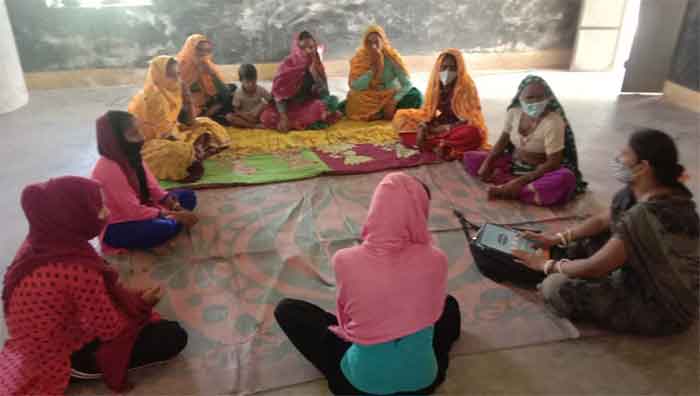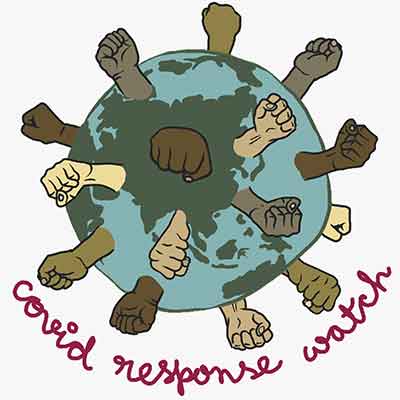
Jaipur: Last year, as the Covid-19 pandemic raged across the world, 20-year-old Vineeta Meena’s dream of becoming a police officer seemed all but lost. Meena, a resident of Gokalpur village in Sapotra Block of Karauli district in Rajasthan was suddenly at home trying to thwart the repeated attempts of her parents to marry her off.
“In March 2020, owing to the lockdown, I had to stop my coaching for competitive examinations and stay at home. I thought after some time everything will be normal and I will able to continue. But I was wrong. The pandemic had not only changed our lifestyle but also the priorities of our parents. My parents started desperately looking for a groom for me and my younger sister”, said Vineeta Meena.
According to media reports the risk of child marriages has heightened as a result of the pandemic’s economic fallout, as vulnerable households are forced to adopt coping mechanisms. Without alternative sources of income they reduce their expenditure by reducing the size of the family and marrying off their child early.
For Vineeta the only choice, if she was to fulfil her professional ambitions, was to resist the pressure to get married. It didn’t take long to realise that she was not the only one facing this problem. There were many other girls of her age whose ambitions were on the verge of being dashed by the pandemic, which had made their parents more eager to marry them off at a very young age.
The girls felt there was need for a platform where they can raise their voice and opinions and eventually convince their parents to delay their weddings. Following this, in October 2020, a group of ten girls started a door-to-door campaign for raising awareness about education for girls and to put up strong resistance to child marriage in Karauli district.
Karauli is one of the four districts of Rajasthan identified by the NITI Aayog in 2018 for its ‘inspirational districts’ programme, meant for districts that show poor performance in health, nutrition, agriculture and education sectors. A 2018 report by the National Commission for the Protection of Child Rights, placed Karauli among the top 100 districts in the country with the highest prevalence of child marriage.
According to UNICEF each year, at least 1.5 million girls under 18 get married in India, which makes it home to the largest number of child brides in the world – accounting for a third of the global total. Nearly 16 per cent adolescent girls aged 15-19 are currently married.
While the prevalence of girls getting married before age 18 has declined from 47 per cent to 27 per cent between 2005 and 2016 the Covid pandemic seems to have reversed some of the progress on this front.
 One of the major achievements of the organization set up by Vineeta and other girls, called the Dalit Adivasi Pichda Varg Kishori Shiksha Abhiyan, is that they have managed to start a public discussion on child marriage and also prevent them in some cases.
One of the major achievements of the organization set up by Vineeta and other girls, called the Dalit Adivasi Pichda Varg Kishori Shiksha Abhiyan, is that they have managed to start a public discussion on child marriage and also prevent them in some cases.
“We started meeting at home, Anganwadi centres, in the park, on a terrace, under the tree – to discuss the issues adolescent girls faced such as an excess of chores, inability to devote time to education, marriage pressure and mental pressure. We slowly started moving from one village to another and visited houses, schools and even colleges. In the beginning, around 100 girls mobilized two girls each in 50 villages, who in turn mobilized 10-15 more girls in their villages.
“We were able to continue the movement and it started becoming bigger” says Vineeta, who successfully managed to delay her own wedding by convincing her parents.
“Marriages of adolescent girls in Dalit and Adivasi communities in Karauli district is not something new. But during Covid-19 we got to hear about more such incidences where parents even got their two daughters married on the same day owing to job losses, no work and poor financial conditions. In this situation there is a massive need for such movements to fight the notion that girls are a burden”, said Bablu Meena, principal at the Senior secondary school at Gajju Pura Village, block Sapotra in Karauli.
Currently, Vineeta’s group, which is part of the ‘Rajasthan Rising’ movement, is 1240 girls strong in Karauli and has also reached nearby districts Alwar, Tonk, Bundi and Ajmer. The goals of the group include timely scholarships to all eligible girls for secondary education, no child labour, no child marriage, and fighting gender discrimination in society and institutions.
“The marriages of adolescent girls can be reduced only if the government gives them financial assistance to study during the pandemic, in addition to the existing scholarship, which is only Rs 3,000 per annum”, says Bablu Meena, who also holds the post of Panchayat Education Officer at the Gajju Pura Village,.
Another key mover behind the Rajasthan Rising movement is Priyanka Bairwa, a student of BA second-year student from a Dalit family, who wants to bring change in society by spreading awareness about girls education.
“Since I was in class 10th I have faced the pressure of getting married. My father had lost his job, and my mother worked as a house help and I used to assist her. I could feel the discrimination in society towards me being considered of ‘lower caste’. The houses where I used to work would serve me tea in a disposable cup and even tell me to sit on the floor. Slowly I realized that education is the only thing that can erase the prevailing discrimination. Hence despite our bad financial conditions, I continued to study and even got enrolled in a college”, says Priyanka, who hails from Ramathra Village, two kilometres away from Sapotra Block in Karauli.
There was pressure from her family during the pandemic to get married, but she wanted to complete her graduation. After learning about similar cases in her area she started Rajasthan Rising with advice and assistance from the Alwar Mewar Institute of Education and Development (AMIED), an NGO working in the rural areas of Rajasthan.
“This is a big movement where girls from the tribal community have learned leadership skills. They formed physical, as well as WhatsApp groups, which created pressure on parents in the district. They also sent 100 emails to Rajasthan Chief minister Ashok Gehlot. The emails have their stories and concerns as well as their demands, which includes spread of girls education, more scholarships for tribal girls and other demands”, said Noor Mohammad, founder member of AMIED.
Through this movement, girls in this entire region of Rajasthan have become socially and politically aware with enhanced agency and voice. The girls have also knocked on the doors of the village sarpanches in the area and the MLA from Karauli, to get support from their elected representatives.
“There should not only be an increase in the scholarship amount for girls from Adivasi and Dalit communities but the disbursal of the amount should be done at the beginning of the session so that the family does not have to think twice before paying their fees. The tribal girls also reached out to us for help and demanded to make education free till secondary school as many were forced to leave their schools” said Abhishek Meena, Sarpanch of Salempur Gram Panchayat.
“The movement helped us to know each other’s issues. Now I think I am not alone, but part of a group where girls get together and share our problems and come up with solutions” says Priyanka.
Tabeenah Anjum is a journalist and a visual storyteller based in Rajasthan.
Related posts:
Related posts:
Views: 0
 RSS Feed
RSS Feed

















 July 31st, 2021
July 31st, 2021  Awake Goy
Awake Goy  Posted in
Posted in  Tags:
Tags: 
















